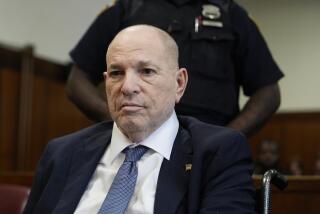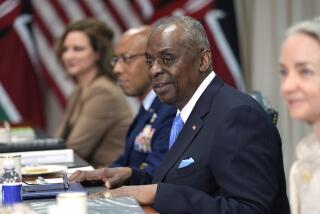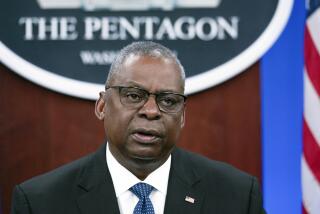Aspin Back on Job; Pacemaker Implant Urged
- Share via
WASHINGTON — Defense Secretary Les Aspin was released from the hospital Thursday but his physicians said they had recommended that he undergo surgical implantation of a cardiac pacemaker to help control his heart problem.
Aspin looked pale but appeared in good spirits as he emerged from Georgetown University Medical Center. Despite his physicians’ recommendations that he temporarily cut back his work pace, he went almost immediately back to his desk at the Pentagon.
Later, he accompanied Gen. Colin L. Powell, chairman of the Joint Chiefs of Staff, to Capitol Hill to brief members of Congress on President Clinton’s plan to airdrop supplies into war-torn Bosnia.
It was not immediately clear whether Aspin had agreed to implantation of the pacemaker, although his cardiologist, David Pearle, said at a press conference that he believes Aspin will do so.
The pacemaker would be implanted just below his collarbone in a two-hour procedure that would require two to three days in the hospital.
The 54-year-old former Wisconsin congressman spent 3 1/2 days in an intensive-care unit after a reaction to a typhoid vaccine apparently aggravated an existing heart condition, leaving him acutely short of breath.
Pearle said that while Aspin had “improved dramatically” over the previous 24 hours, the secretary had experienced mild worsening of symptoms of his underlying heart ailment.
The ailment, hypertrophic cardiomyopathy, from which Aspin suffers is congenital. It restricts the amount of blood pumped from the heart. Pearle also said that Aspin had mild coronary artery disease.
Nonetheless, doctors said, they expect the secretary to recover fully and be able to perform the strenuous duties of his job.
Pearle said physicians had concluded that Aspin needs the pacemaker to help manage the problem “over the long run.” But, he added, “we don’t feel it’s so urgent” that it must be done immediately.
The physicians also said that they had recommended, for now, against open-heart surgery to reduce the thickening in the muscle because the condition was not serious enough.
Al Soloman, another of Aspin’s physicians, said that the implantation of a pacemaker would not in itself eliminate the underlying heart problem but he predicted that Aspin would be “very likely” to see a significant improvement in his symptoms once it is in place.
The physicians also discounted the prospect that Aspin might die suddenly because of his heart condition. Pearle told a press conference that “there is risk of sudden death, but given proper treatment . . . the risk is very small.”
Aspin left the hospital on foot, eschewing the usual wheelchair ride, largely to help dispel rumors that he is seriously ill. He also delayed his departure to conduct a press conference.
Even so, it was clear that he would have to cut back, at least for the near future, on his 14-hour workdays, raising concerns that the Defense Department’s operations could be impaired further at a critical time in the transition to a post-Cold War armed force.
Not only does Aspin have a full workload, including everything from budget problems to the issue of gays in the military, but White House delays have held up appointments of department officials. Aspin is the only top Pentagon official who has been confirmed.
The Senate Armed Services Committee met Thursday to consider the nomination of William J. Perry, a California consulting firm executive, to be deputy secretary of defense. It was forced to postpone any action, however, until an FBI background investigation of the nominee is completed.
More to Read
Sign up for Essential California
The most important California stories and recommendations in your inbox every morning.
You may occasionally receive promotional content from the Los Angeles Times.













